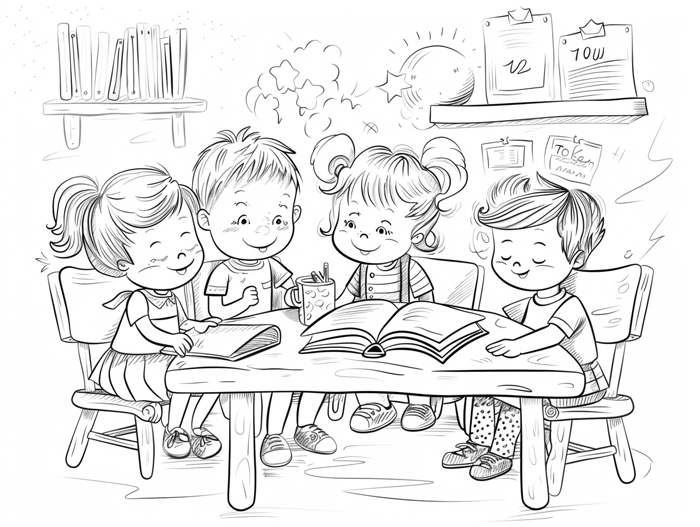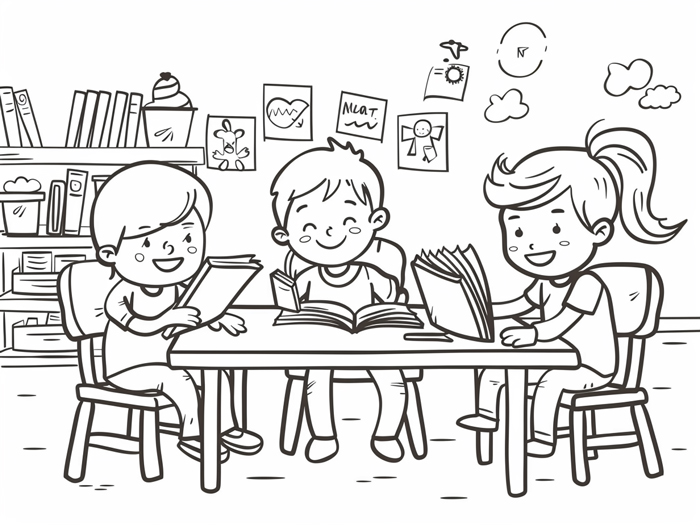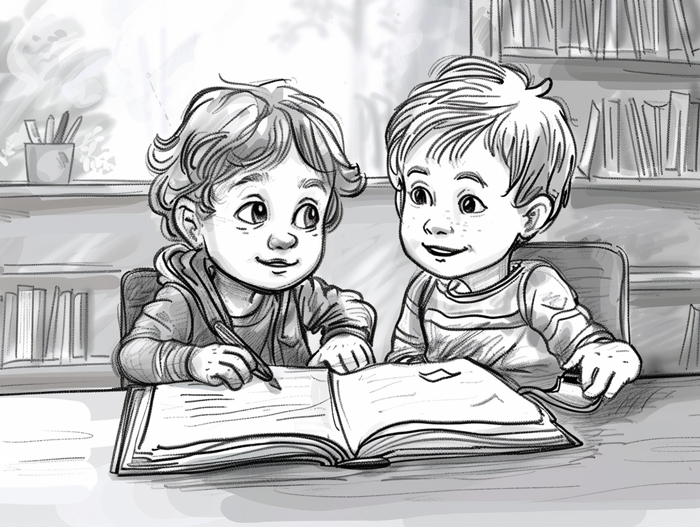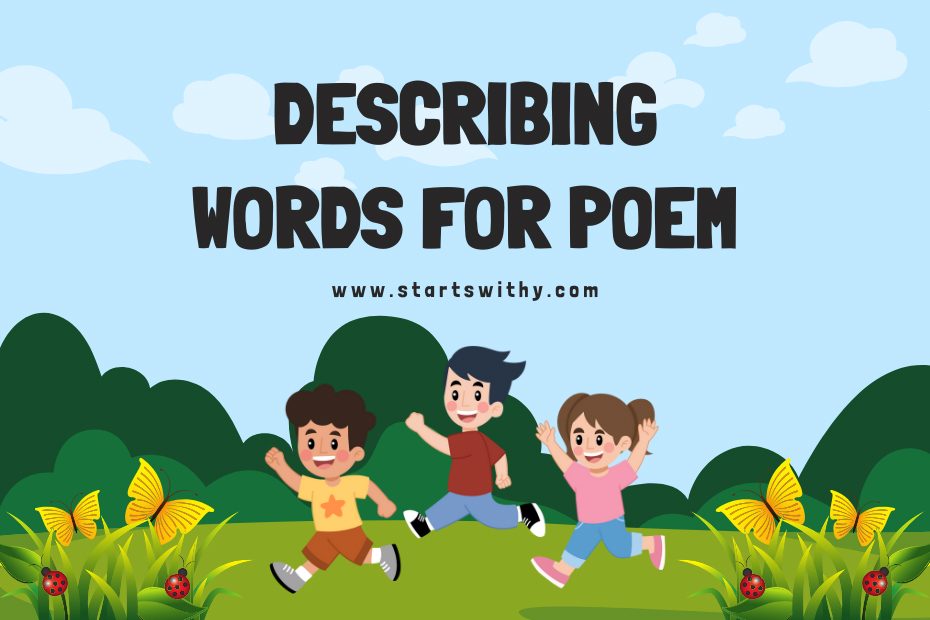When it comes to describing a poem, the right adjectives can make all the difference. They have the power to evoke emotions, paint vivid imagery, and capture the essence of the poet’s words. In this article, I’ll be sharing a list of adjectives that you can use to enhance your poetry analysis or add depth to your own poetic creations. From enchanting and ethereal to melancholic and profound, these adjectives will help you bring your poems to life.
Adjectives play a crucial role in poetry, as they allow us to delve deeper into the nuances and intricacies of the poet’s message. Whether you’re analyzing a classic sonnet or crafting your own verses, having a diverse vocabulary of descriptive words at your disposal can elevate your writing to new heights. In this article, I’ll be providing examples of adjectives that can be used to describe various aspects of a poem, such as its tone, imagery, and theme. So, let’s dive in and explore the world of adjectives for poems, unlocking the potential to create and appreciate the beauty of language.
How to Describe poem? – Different Scenarios

Describing a poem is an art in itself. It requires careful observation, analysis, and the ability to capture the essence of the poet’s words. In this section, I’ll guide you through different scenarios on how to effectively describe a poem. Whether you’re exploring the tone, imagery, or theme, these descriptive words will help you elevate your poetry writing. Let’s dive in!
1. Describing the Tone:
The tone of a poem sets the mood and emotional atmosphere. It can be joyful, melancholic, or even mysterious. To describe the tone, consider using these adjectives:
| Adjective | Example |
|---|---|
| Romantic | “The poem carries a romantic tone, depicting love and passion.” |
| Melancholic | “The poet’s use of somber imagery creates a melancholic tone throughout the poem.” |
| Playful | “With its lighthearted language and whimsical imagery, the poem exudes a playful tone.” |
2. Describing the Imagery:
Imagery in a poem paints vivid pictures in the reader’s mind. By using descriptive words, you can effectively convey the sensory experience. Here are some adjectives to describe imagery:
- Visual: “The poem’s vivid descriptions of vibrant colors transport the reader into a visual wonderland.”
- Auditory: “The poet’s use of onomatopoeia creates an auditory feast, as if the words themselves are singing.”
- Tactile: “The poem’s tactile imagery evokes a sense of touch, allowing the reader to feel the texture of the words.”
3. Describing the Theme:
A poem often revolves around a central theme or message. To describe the theme, use these adjectives:
- Thought-provoking: “The poem tackles the complexities of life, prompting deep reflection in the reader.”
- Inspirational: “The poet’s uplifting words and motivational theme encourage the reader to embrace their inner strength.”
- Symbolic: “The poem employs symbolic imagery to convey a deeper meaning, inviting interpretation and analysis.”
Remember, describing a poem is subjective, and different readers may have different interpretations. Use these adjectives as a starting point and let your own creative voice take flight. Happy writing!
Describing Words for poem in English
When it comes to describing a poem, choosing the right adjectives can bring the words and the emotions to life. Whether you’re a teacher looking to expand your students’ vocabulary or just a poetry enthusiast, here are some descriptive words that you can use to enhance your understanding of a poem.

Tone
The tone of a poem sets the overall mood or atmosphere conveyed by the poet. Here are some adjectives to help you describe the tone of a poem:
- Gentle: The poem has a soothing and peaceful tone.
- Melancholy: The poem evokes a sense of sadness and longing.
- Energetic: The poem exudes excitement and liveliness.
- Mysterious: The poem leaves you with a sense of wonder and intrigue.
Imagery
Imagery in a poem refers to the use of vivid and sensory language that creates mental pictures for the readers. Here are some adjectives to describe the imagery used in a poem:
- Lush: The poet’s words paint a rich and vibrant picture in your mind.
- Vivid: The imagery is so detailed and clear that it feels real.
- Serene: The poem creates a calm and peaceful image.
- Striking: The imagery used in the poem leaves a strong and memorable impression.
Theme
The theme of a poem refers to the underlying message or central idea that the poet is trying to convey. Here are some adjectives to capture the essence of the theme in a poem:
- Poignant: The poem touches upon deep and heartfelt emotions.
- Reflective: The poem encourages contemplation and self-reflection.
- Empowering: The poem inspires and motivates the reader.
- Timeless: The theme of the poem transcends time and remains relevant.
Remember, these adjectives are just a starting point to help you analyze and appreciate a poem. Feel free to explore and let your own creative voice take flight, as describing a poem is a subjective experience. By using descriptive words, you can develop a deeper understanding and appreciation for the art of poetry.
Let’s move on to the next section where I’ll provide some examples of how these adjectives can be used in a poem.
Adjectives for poem

Positive Adjectives for Poem with 12 Example Sentences
When describing a poem, there are numerous positive adjectives that can help you capture the essence of the piece. Here are 12 examples of positive adjectives you can use to describe a poem:
| Adjective | Example Sentence |
|---|---|
| Beautiful | The poem is a beautiful expression of love and longing. |
| Captivating | The poem’s imagery is captivating, transporting the reader. |
| Enchanting | The enchanting language of the poem creates a magical atmosphere. |
| Inspiring | This poem is truly inspiring; it encourages self-reflection. |
| Eloquent | The poet’s words are eloquent, drawing the reader in. |
| Melancholic | The poem carries a melancholic tone, evoking a sense of longing. |
| Serene | The serene imagery in the poem brings a sense of tranquility. |
| Vibrant | The vibrant language in this poem carries a strong emotional impact. |
| Whimsical | The poem’s whimsical tone adds a touch of playfulness. |
| Thought-provoking | This thought-provoking poem challenges societal norms. |
| Evocative | The poem’s use of vivid imagery is evocative and memorable. |
| Uplifting | This uplifting poem brings hope and joy to the reader. |
As you describe a poem, remember that the choice of adjectives is subjective, and it’s essential to let your own creative voice shine through.
Negative Adjectives for Poem with 5 Example Sentences
While we often focus on the positive aspects of a poem, it’s also important to consider negative adjectives that can highlight different elements of the piece. Here are 5 examples of negative adjectives you can use to describe a poem:
| Adjective | Example Sentence |
|---|---|
| Confusing | The poem’s structure and imagery can be confusing to interpret. |
| Clichéd | This poem relies on clichéd metaphors and lacks originality. |
| Repetitive | The poem’s repetitive language becomes monotonous after a while. |
| Dull | Unfortunately, this poem falls flat and lacks excitement. |
| Disjointed | The poem feels disjointed, making it difficult to follow. |
While negative adjectives can help provide a balanced perspective, remember that the interpretation of a poem can vary from person to person.
Synonyms and Antonyms with Example Sentences

Synonyms for poem
When it comes to describing a poem, there are many synonyms that can help convey the beauty and essence of the written piece. Here are some synonyms that you can use:
- Verse
- Ballad
- Sonnet
- Ode
- Rhyme
- Stanza
Let’s take a look at some example sentences that show how these synonyms can be used:
| Synonym | Example Sentence |
|---|---|
| Verse | I was captivated by the enchanting verses of the poem. |
| Ballad | The ballad told a poignant story of love and loss. |
| Sonnet | The sonnet painted a vivid picture of nature’s beauty. |
| Ode | The poet composed an ode to the wonders of the universe. |
| Rhyme | The children giggled at the playful rhymes in the poem. |
| Stanza | Each stanza of the poem revealed a new layer of emotions. |
Antonyms for poem
Sometimes, it can be helpful to describe a poem by using its opposite, or antonym. Here are some antonyms that can be used to describe a poem:
- Prose
- Narrative
- Story
- Novel
- Essay
- Article
Let’s see how these antonyms can be incorporated into example sentences:
| Antonym | Example Sentence |
|---|---|
| Prose | The poet’s words transcended the boundaries of prose. |
| Narrative | The poem told a gripping narrative of adventure and bravery. |
| Story | The poem wove a magical story of love and courage. |
| Novel | The poet’s words had the depth and richness of a great novel. |
| Essay | The poem’s vivid imagery and deep insights resembled an essay. |
| Article | The poem read like a beautifully crafted literary article. |
Remember, the choice of synonym or antonym to describe a poem is subjective and can vary depending on the individual’s interpretation. The important thing is to let your creative voice shine through and find the words that best capture the essence of the poem.
Conclusion
In this article, I have explored the various adjectives that can be used to describe a poem. I have provided a comprehensive list of synonyms and antonyms, along with example sentences for each word. It is important to remember that the choice of adjective is subjective and can vary depending on the individual’s interpretation of the poem.
Describing a poem is an art in itself, as it requires capturing the essence and emotions conveyed by the words on the page. By using the right adjectives, we can enhance the reader’s understanding and appreciation of the poem.
However, it is crucial to let your creative voice shine through when describing a poem. Don’t be afraid to experiment with different adjectives and find the words that best capture the unique qualities of the poem. Trust your instincts and allow your personal interpretation to guide your choice of words.
The adjectives we use to describe a poem play a significant role in conveying its beauty and depth. So, go ahead and explore the vast array of adjectives available to you, and let your words paint a vivid picture in the minds of your readers.



